
Freepik / Herb
Are Edibles Addictive For New Users? What First-Timers Should Know
Exploring the connection between THC edibles and addiction risk.
It’s been well over ten years since Canada and a few US states legalized recreational cannabis. With that comes a lot more cannabis users.
One of their favorite options? Edibles. They’re discreet, smoke-free, and produce pretty powerful effects in higher doses.
These cannabis-infused products—ranging from baked goods to THC gummies—deliver tetrahydrocannabinol (THC) and other compounds from the cannabis plant to produce the familiar buzz we get from weed.
But with the rise in edible consumption comes a growing concern: could these tasty, convenient products be more addictive than we think? Researchers, including those from the National Institute on Drug Abuse and American Addiction Centers, are now investigating whether edibles pose a higher risk of developing dependence or addiction to cannabis compared to smoking.
This article explores the potentially addictive nature of edibles and how to consume them responsibly, especially if you’re a new user.
What Does It Mean To Be Addicted To Cannabis?

Freepik / Herb
When it comes to cannabis, addiction is clinically known as cannabis use disorder (CUD).
According to addiction expert Gabor Maté, addiction is “a complex psycho-physiological process manifested in any behavior in which a person finds pleasure and relief and therefore craves, but suffers negative consequences without being able to give it up.”
The main culprit responsible for cannabis addiction? Tetrahydrocannabinol (THC), the key psychoactive cannabinoid in cannabis plants, produces a rewarding, euphoric feeling that can trigger compulsive use.
The National Institute on Drug Abuse reports that about 30% of cannabis users develop cannabis use disorder. And that rate skyrockets if the person started using cannabis as a teen.
Sure, plenty of cannabis users incorporate weed into their daily routines without issue. But it’s always worth asking—at what point do the negatives start outweighing the positives?
For some, quitting cannabis isn’t as simple as just stopping. Common withdrawal symptoms include:
- Impaired memory
- Sleep disturbances
- Decreased appetite
- Abdominal pain
- Restlessness
- Irritability
- Cravings
While cannabis addiction may not cause the same physical dependence as alcohol or opioids, long-term use can still lead to a frustrating cycle of psychological dependence.
But here’s the real question—are edibles addictive?
Can You Get Addicted To Edibles As A First-Time User?

Elsa Olofsson / Unsplash
No, first-time consumption of marijuana edibles will not result in immediate addiction. It takes frequent, repeated behavior to start developing a dependence on cannabis’s main psychoactive compound, THC.
However, what’s more likely with cannabis edibles is accidental overconsumption. When consuming cannabis edibles, THC is metabolized differently than when smoking marijuana.
Edibles must travel through the lengthy digestive tract and into the liver, where THC is converted to 11-hydroxy-THC. This digested form of THC is stronger than the effects of smoking cannabis, and those effects last much longer.
The potency of edibles, combined with the delayed onset (typically 30-90 minutes), might lead to overconsumption when users don’t feel immediate effects and decide to pop another dose.
That can result in something known as acute marijuana intoxication. To avoid it, keep these tips in mind when using edibles:
- Dosage: High THC concentrations increase the risk of addiction and adverse effects.
- Frequency: Regular, daily use is far more likely to lead to addiction than occasional, moderate consumption.
- Individual Vulnerabilities: Everyone reacts differently to cannabis. Factors like tolerance, genetics, weight, past substance use, and mental health conditions all play a role.
A Great Starting Point: THC Gummies By Chicago Cannabis Company
This dose from Chicago Cannabis Company is the perfect starting point for new edible users. The Chicago Gummies: Blood Orange Artist Series (100mg) contains 10mg Delta-9 THC per piece, with 100mg THC per pack (10 total gummies).
Made from clean ingredients like tapioca syrup, sugar, honey, and natural flavors, these gummies also help you support local artists with your purchase.
The cool packaging artwork? It was designed by a local Chicago artist, as with all of Chicago Cannabis Company’s Artist Series gummies.
These cannabis edibles are dosed to deliver a balanced and calming high. Get them shipped nationwide, or stop by in person for pickup or local Chicago delivery.
Can CBD Gummies Be Addictive?

Elsa Olofsson / Unsplash
Unlike THC edibles, CBD edibles are not considered addictive, even with regular use. While CBD interacts with the body’s endocannabinoid system, it doesn’t produce the euphoric “high” associated with THC—making it far less likely to cause dependence or cravings.
CBD is even being studied for its anti-addictive properties that might help individuals wean off other addictive substances.
However, it’s worth noting that while CBD is not addictive, developing a habit or routine around its use is possible, especially if you rely on it for daily relief or relaxation. But that’s not the same as addiction—it’s more about forming a habit than a compulsive need.
Bottom line: While CBD gummies are generally safe for regular use, it’s always smart to be mindful of how often and why you’re reaching for them.
Are Edibles More Addictive Than Other Forms Of Cannabis?

Freepik / Herb
In short, no. Cannabis-infused edibles and other consumption methods like smoking still have the same potential for addiction with repeated use.
However, there are a few things to note specifically about the addictive potential of edibles:
Potency & Duration: Cannabis edibles often produce stronger and longer-lasting effects compared to all other consumption methods. The long-lasting effects might increase the risk of psychological dependence.
Delayed Onset: Since it takes a while for cannabis edibles to kick in, it can lead to overconsumption and increase the risk of dependence.
Accessibility & Discretion: Edibles are perhaps the most discreet way to use cannabis. The fact that you could munch on a THC edible anywhere might make it more convenient and thus easier to develop an addiction.
Using Edibles Responsibly: Tips For New Users

Margo Amala / Unsplash
The key to steering clear of marijuana addiction? Responsible consumption. Here are some tips new users should consider when consuming cannabis edibles:
Start Low, Go Slow: The standard dose is 10mg THC. Try even half or a quarter of that to gauge how you feel before trying more.
Wait The Full Onset Time: Wait 1-2 hours for the effects to kick in before taking more. Cannabis edibles are sneaky, and their effects can appear unexpectedly.
Be Aware of THC Content: Always check product packaging for how much THC is in each serving and the total package.
Avoid Mixing Substances: Combining edibles with alcohol or other drugs can increase negative side effects.
Take it slow, know your dose, and consume edibles responsibly for the best possible outcome.
Herb Recommended Products:
READ MORE










